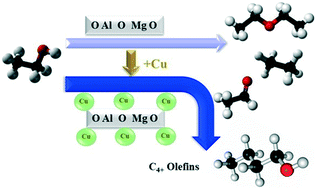Ethanol condensation at elevated pressure over copper on AlMgO and AlCaO porous mixed-oxide supports†
Abstract
The coupling of ethanol to produce C4-compounds by Guerbet condensation at 325 °C was studied using porous mixed oxide catalysts of AlMgO and AlCaO prepared by the emulsion mediated method with and without the addition of Cu. The synthesis procedure was effective in preparing materials with higher porosity and BET area. Cu catalysts show improved yields and selectivities at elevated H2 pressures, which is related to ethanol dehydrogenation equilibrium shifts. Without Cu, AlMgO catalysts were more selective to diethyl ether (45–55 C%) than higher alcohols and aldehydes (30–40 C%), while AlCaO catalysts had no activity for ethanol conversion. The addition of Cu inhibited production of diethyl ether while promoting dehydrogenation to acetaldehyde, the initial step in Guerbet coupling of ethanol. Copper addition increased the activity and the selectivity to higher alcohols and aldehydes (up to 55 C% selectivity) for all catalysts. Olefins and paraffins comprised the majority of the side products formed with Cu-doped catalysts. The ethanol conversion levels off near 30% with decreasing space velocity due to inhibition by water and other products.

- This article is part of the themed collection: 2019 Catalysis Science & Technology HOT Articles


 Please wait while we load your content...
Please wait while we load your content...